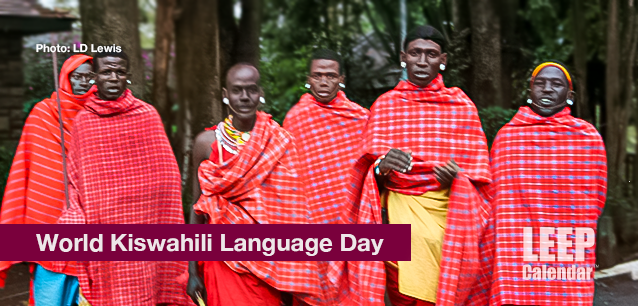 AD
AD
Today is: August 13
Scroll to explore events active on this date.
Additional Events on LEEP
LEEP INK FEATURES

August? Absolutely!
In August, we live through the Dog Days of Summer. It's hot and often humid, and those who can leave for better climates do. Down south, winter is in full force. August is also known as "the ...

In The Heat of July: July 2025 Events
Is it hot enough (or cold enough if you're below the equator) for you yet? There is actually a day for that! Like every month, I pick a diverse collection of events you may or may not know about. This ...

May Blooms: Events in May 2025
Along with October, May is one of the most densely packed months of the year. It's before the summer humidity and the last whole month of the school year. The weather is warming in t...
About World Kiswahili Language Day
Education , Africa
Ends: Jul 07, 2025
DESCRIPTION:
In the 1950s, the United Nations established the Kiswahili language unit of United Nations Radio. Today, Kiswahili is the only African language within the Directorate of Global Communications at the United Nations. The UN General Assembly, through its resolution 71/328 of 11 September 2017, advocated for a day dedicated to each of its official languages to promote awareness of their history, culture, and use. The resolution also encouraged the expansion of this initiative to other non-official languages spoken globally.
In response, the 41st session of the General Conference of UNESCO adopted resolution 41 C/61, which recognized the role of the Kiswahili language in promoting cultural diversity, fostering dialogue among civilizations, and advancing multilingualism as a core value of the UN. As such, UNESCO proclaimed 7 July each year as World Kiswahili Language Day, making Kiswahili the first African language to be recognized in such a manner by the UN.
Kiswahili, a Bantu language, is one of the most widely spoken African languages, with over 200 million speakers and more than a dozen main dialects. It is a common form of communication in many parts of sub-Saharan Africa and the Middle East, bridging both past and present.
VIDEOS
Currently, this event does not have supporting videos.
SUPPORTING DOCUMENTS
Currently, this event does not have supporting documents.
ADDITIONAL IMAGES
Currently, this event does not have supporting images.
Where would you like to go now?
 AD
AD


/footer-logo.svg)
